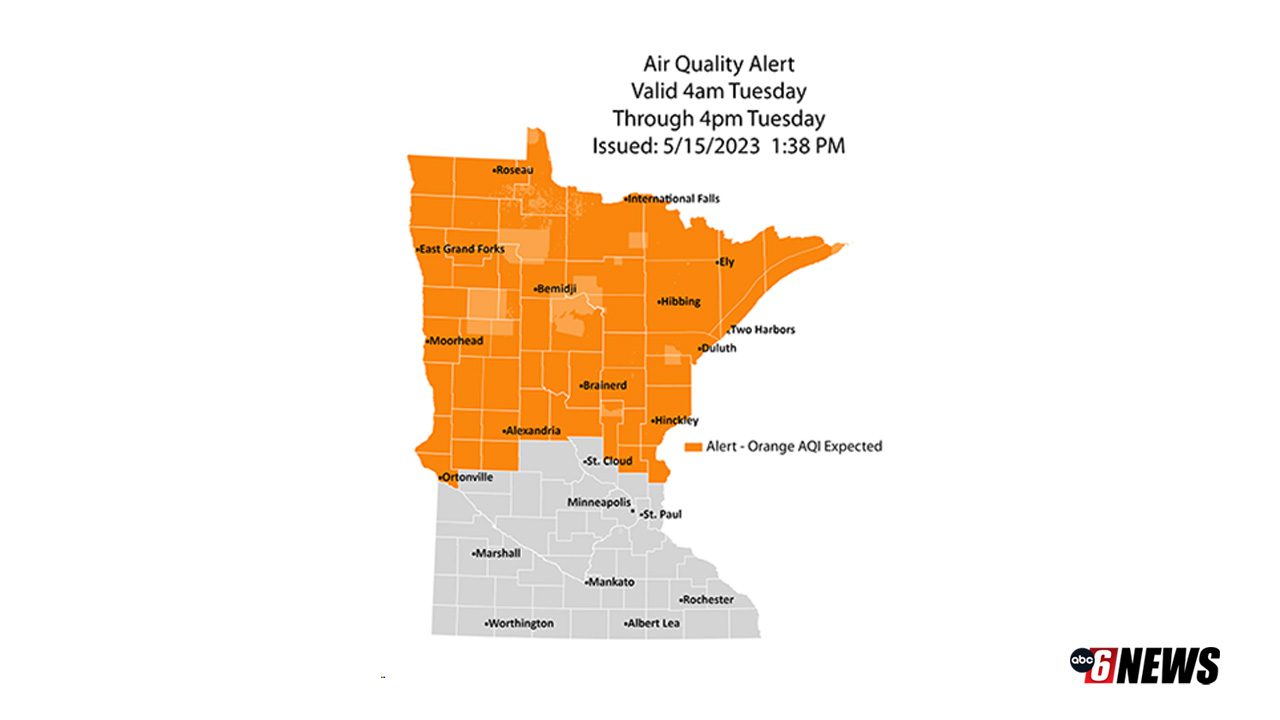Air quality alert issued for northern MN due to wildfire smoke

The Minnesota Pollution Control Agency (MPCA) has issued an air quality alert for northern Minnesota.
(ABC 6 News) – The Minnesota Pollution Control Agency (MPCA) has issued an air quality alert for northern Minnesota. The alert takes effect Tuesday, May 16, beginning at 4 a.m. and runs until Tuesday, May 16, at 4 p.m.
The affected area includes the northern half of Minnesota, and the tribal nations of Grand Portage, Fond du Lac, Leech Lake, Red Lake, and Mille Lacs.
A band of smoke from wildfires in northern Alberta and Saskatchewan is currently moving east across Ontario. A strong cold front will dive south overnight and begin pulling this smoke south towards Minnesota. Sinking air behind the front will bring this smoke to the surface. Smoke will cross the Canadian border into northern Minnesota around 4 a.m. Tuesday. Northerly winds will push the smoke as far south as Hinckley and Alexandria by Tuesday afternoon.
Air quality should improve across northeast Minnesota Tuesday afternoon. Smoke may linger across northwest Minnesota through Tuesday.
Fine particle levels are expected to reach the orange air quality index (AQI) category, a level considered unhealthy for sensitive groups, across northern Minnesota. This area includes Ely, International Falls, Roseau, Duluth, Brainerd, Moorhead, and the tribal nations of Grand Portage, Fond du Lac, Leech Lake, Red Lake, and Mille Lacs. In the orange area, sensitive groups should avoid prolonged time outdoors.
Poor air quality impacts health. Fine particle pollution from wildfire smoke can irritate eyes, nose, and throat, and cause coughing, chest tightness, shortness of breath, dizziness, or fatigue. Smoke particles are small enough that they can be breathed deeply into lungs and enter the bloodstream. This can lead to illnesses such as bronchitis or aggravate existing chronic heart and lung diseases, triggering heart palpitations, asthma attacks, heart attacks, and strokes.
Certain groups experience health effects from unhealthy air quality sooner than others, either because they are more sensitive to fine particle pollution or because they are exposed to larger amounts of it.
Sensitive groups include:
- • People who have asthma or other breathing conditions like chronic obstructive pulmonary disease (COPD)
- • People who have heart disease, high blood pressure, or diabetes
- • Pregnant people
- • Children and older adults
- People with increased exposure include:
- • People of all ages who do longer or more vigorous physical activity outdoors
- • People who work outdoors, especially workers who do heavy manual labor
- • People who exercise or play sports outdoors, including children
- • People who don’t have air conditioning and need to keep windows open to stay cool
- • People in housing not tight enough to keep unhealthy air out, or who do not have permanent shelter.
- Anyone experiencing health effects related to poor air quality should contact their health care provider. Those with severe symptoms, chest pain, trouble breathing, or who fear they may be experiencing a heart attack or stroke should call 911 immediately.